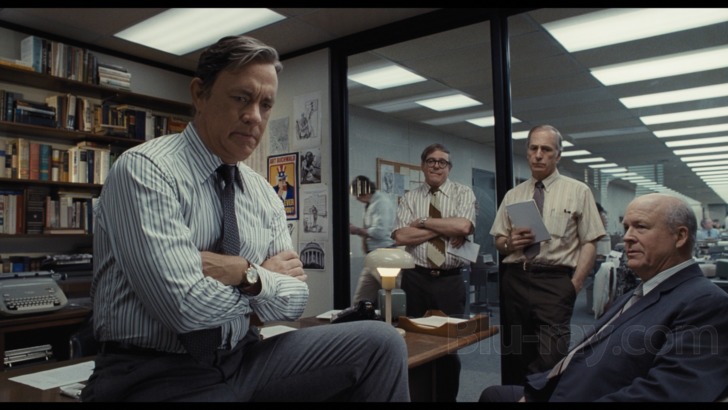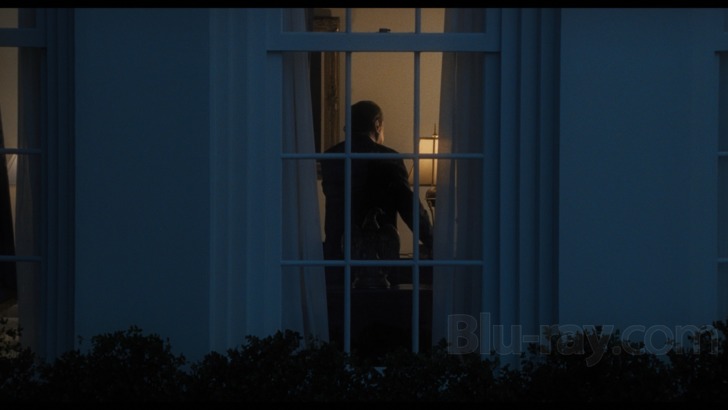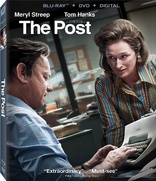The Post Blu-ray Movie
HomeThe Post Blu-ray Movie 
Blu-ray + DVD + Digital Copy20th Century Fox | 2017 | 116 min | Rated PG-13 | Apr 17, 2018
Movie rating
7.3 | / 10 |
Blu-ray rating
| Users | 0.0 | |
| Reviewer | 4.0 | |
| Overall | 4.0 |
Overview
The Post (2017)
The first female publisher of a major US newspaper and her editor race to catch up with The NY Times to expose a massive cover-up of government secrets that spans three decades.
Starring: Meryl Streep, Tom Hanks, Sarah Paulson, Bob Odenkirk, Tracy LettsDirector: Steven Spielberg
| Biography | Uncertain |
| History | Uncertain |
| Drama | Uncertain |
Specifications
Video
Video codec: MPEG-4 AVC
Video resolution: 1080p
Aspect ratio: 1.85:1
Original aspect ratio: 1.85:1
Audio
English: DTS-HD Master Audio 7.1 (48kHz, 24-bit)
French (Canada): Dolby Digital 5.1
Spanish: Dolby Digital 5.1 (448 kbps)
Subtitles
English SDH, French, Spanish
Discs
Blu-ray Disc
Two-disc set (1 BD, 1 DVD)
Digital copy
DVD copy
Packaging
Slipcover in original pressing
Playback
Region free
Review
Rating summary
| Movie | 4.0 | |
| Video | 4.5 | |
| Audio | 4.5 | |
| Extras | 3.0 | |
| Overall | 4.0 |
The Post Blu-ray Movie Review
The paper and The Papers.
Reviewed by Jeffrey Kauffman April 21, 2018Should The Post really have been about The Times? That’s a question that some journalists who were around when the whole Pentagon Papers story broke might allege, citing the fact that it was in fact the venerable New York institution rather than the then upstart Washington, D.C. entity that actually had the scoop to begin with, and which in fact first published the papers, leading to one of the most legendary showdowns between a free press and government forces supposedly out to keep top secret material just that — secret. That said, the New York Times probably didn’t have characters as memorable as Katharine Graham (Meryl Streep) and Ben Bradlee (Tom Hanks) to serve as focal points for a cinematic treatment, and it is in fact some of the interpersonal relationships rather than the inherent political intrigue that provides The Post with some of its snap and vigor. A lot of our current news cycle has tended to bring up the Watergate scandal and how that event ultimately brought down the Nixon presidency. It’s kind of interesting, then, from a hindsight perspective to watch The Post as its tale of shadowy governmental conspiracies unfolds and to realize, as the screenplay by Liz Hannah and Josh Singer makes clear, that Nixon’s presidency was already in perilous straits as soon as Daniel Ellsberg (Matthew Rhys) decided to “share” top secret information with the press. What’s inherently ironic about this is the fact that much of the data Ellsberg shared didn’t actually involve Nixon’s tenure in office, but focused more on his predecessors, chiefly Presidents Kennedy and Johnson. But Nixon’s tendency to take no prisoners in response to what he perceived as an over zealous media found one of its most potent examples in his administration’s reaction to the release of the Pentagon Papers, and it was that same hyperbolic pushback to the Watergate issue (a break in which is cheekily alluded to in only the final few seconds of The Post) which really spelled Nixon’s own doom. But aside from the subtext of a presidency prone toward paranoia, The Post delves into a number of other issues, not the least of which is a kind of “female empowerment” story as Katharine Graham learns to forcefully take the reins of the Washington Post, in an era when women were largely seen as adjuncts to the male dominated field of journalism.

The Post actually begins in Vietnam in the mid-sixties, documenting a bit of Ellsberg’s perhaps lesser known history. But the main bulk of the film segues forward a few years to offer another perhaps slightly forgotten history, namely the fact that the Washington Post was not always the institution it’s largely recognized as being today. Instead the paper is in dire financial straits and Graham, newly installed in a leadership position after the shocking death by suicide of her husband, finds herself unavoidably ensconced in a "boys' club" where there's little patience for a woman who "thinks" she's in charge. A lot of The Post depicts the chafing relationship between Graham and her supposed underlings (who act, at least initially, as if they were her superiors), as well as the growth Graham experiences as she becomes more comfortable with her power, something that not so coincidentally aligns with the paper’s history making decision to “fight the power” and publish the Pentagon Papers.
It may be well nigh impossible not to compare The Post to All the President's Men, especially since both feature the character of Ben Bradlee as Chief Curmudgeon (so to speak). Hanks’ take on the character is perhaps slightly more patrician feeling than Jason Robards’ interpretation was in the Alan J. Pakula film, but Bradlee becomes the conscience of the film as the story progresses, insisting that the Post do the right, rather than the expedient (or business savvy), thing.
The Post frankly struggles to whip up much suspense (it’s notable to compare it to All the President’s Men in that regard, since the earlier film does manage to create a feeling of anxiety despite its foregone conclusion). Where The Post excels is in its depictions of compelling characters caught up in a story that even they may not have a full understanding of. This unfolding aspect is evident in both Graham's reaction to finally, inevitably being in control and Bradlee's clear eyed vision of what needs to happen and what repercussions that may entail. Steven Spielberg may in fact not be firing on all cylinders with this effort, but even middling Spielberg (and I’d argue this is at least a notch or two above middling) tends to outshine many other lesser directors’ best efforts.
Note: I might have liked The Post a bit more than my colleague Brian Orndorf, who reviewed it during its theatrical exhibition. You can read Brian's thoughts here.
The Post Blu-ray Movie, Video Quality 

The Post is presented on Blu-ray courtesy of 20th Century Fox Home Entertainment with an AVC encoded 1080p transfer in 1.85:1. Shot on film and finished at a 4K DI, The Post is kind of an interesting viewing experience in high definition (and perhaps even more in UHD, which I'll be addressing shortly in our The Post 4K Blu-ray review). There's an almost dowdy aspect (for want of a better term) to the palette here, with an emphasis on browns and grays that keeps things from ever really popping in any meaningful way. Spielberg and cinematographer Janusz Kamiński have also toyed with the image at times, offering what often looks at least slightly desaturated (and at times more than merely slightly), as well as adding intentional "distressing" to moments like the opening flashback to Vietnam. The presentation here is always beautifully organic, and, aside from what may actually be the purposeful addition of a kind of noisy look in some of the extremely grainy Vietnam material, one without any real compression issues, but one that also doesn't boast the typical "shiny objects" that tend to make videophiles' eyes perk up. Detail levels are routinely high, even given the surplus of rather dimly lit interior environments.
The Post Blu-ray Movie, Audio Quality 

The Post's DTS-HD Master Audio 7.1 track is often surprisingly immersive, given the dialogue heavy emphasis of the film. John Williams' pulsing score fills the surrounds quite nicely throughout, but there are a number of well done effects, including things like the click a clack of printing presses, that regularly dot surround channels. Several outdoor scenes also offer good placement of ambient environmental effects. Dialogue is always rendered cleanly and clearly on this enjoyable if often quite subtly designed track.
The Post Blu-ray Movie, Special Features and Extras 

Extra(s)! Extra(s)! Read all about it! (Sorry, couldn't resist.)
- Layout: Katharine Graham, Ben Bradlee and The Washington Post (1080p; 21:51) features a number of excellent interviews, including Steven Spielberg, who talks about how the film is at least as much about Graham's rise to leadership as it is about the release of the Pentagon Papers.
- Editorial: The Cast and Characters of The Post (1080p; 15:56) is another well done set of interviews, with Spielberg commenting how having actual living folks like Daniel Ellsberg around helped to inform the film's authenticity.
- The Style Section: Recreating an Era (1080p; 17:02) focuses on the production design team's efforts to recreate 1971.
- Stop the Presses: Filming The Post (1080p; 25:34) gets into some production issues, including the genesis of the project.
- Arts and Entertainment: Music for The Post (1080p; 6:45) features the inimitable John Williams.
The Post Blu-ray Movie, Overall Score and Recommendation 

I had a kind of cool "brush with history" that involved both an icon of the Vietnam War and freedom of the press issues, albeit about a decade or so after the events depicted in The Post. General William Westmoreland and his wife journeyed to Salt Lake City to help celebrate a military award my father (a Major General himself) had won. The most remarkable thing about this visit (other than the lemons from Bob Hope's house that General Westmoreland gifted me with) was Westmoreland's unrelenting outrage over his then fairly recent CBS interview with Mike Wallace that had covered some of the same supposed subterfuge in "official" reporting about the Vietnam War that the Pentagon Papers outlined. If I recall correctly, Westmoreland either hadn't quite decided yet to sue CBS for libel, or perhaps was in the very earliest stages of preparing that lawsuit, but I remember as if it were yesterday a family dinner at my parents' house where the entire "conversation" around the table (more like a monologue, actually) was Westmoreland vehemently defending not only how he had served his country, but how he had reported aspects of the Vietnam War to his superiors and, by default, the public at large. It was an early and visceral instruction into what might be termed a Rashomon- esque response to ostensibly "objective" data points, but it also made me explicitly aware of the almost unavoidable tension between a free press and those serving in some sort of official capacity. Westmoreland ultimately more or less dropped the lawsuit (settling for an apology), in what might be seen as a tacit admission that the First Amendment is probably always going to trump governmental secrecy or in fact any (official) individual's feelings that their reputations have been harmed, an admission no doubt informed by the environment fostered explicitly by the Pentagon Papers release and, subsequently, the whole Watergate affair. The Post may not offer the same personal umbrage that I experienced first hand listening to General Westmoreland, but it gives an outstanding overview of the issues involved, while also detailing a number of supposedly "tangential", but in some ways more emotionally forceful, elements that Graham, Bradlee and their crew of intrepid reporters faced in attempting to bring the truth to the American people. Fox offers a disc with solid technical merits and some appealing supplements, and The Post comes Recommended.
Similar titles
Similar titles you might also like

Cesar Chavez
2014

Mark Felt: The Man Who Brought Down the White House
2017

Darkest Hour 4K
2017

Shock and Awe
2017

The Fifth Estate
2013

LBJ
2016

Woman Walks Ahead
2017

Charlie Wilson's War
2007

Vice
2018

Jimmy's Hall
2014

Lincoln
2012

The Front Runner
2018

Bridge of Spies
2015

Fair Game
2010

Dark Waters
2019

A Beautiful Day in the Neighborhood
2019

All the President's Men
Two-Disc Special Edition | featuring All the President's Men Revisited
1976

On the Basis of Sex
2018

J. Edgar
2011

Mandela: Long Walk to Freedom
2013

